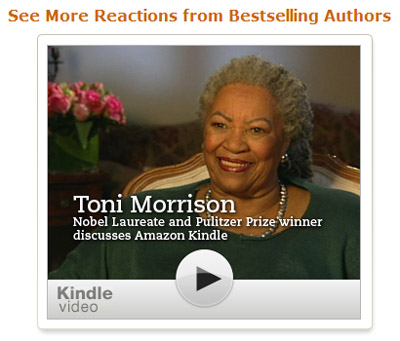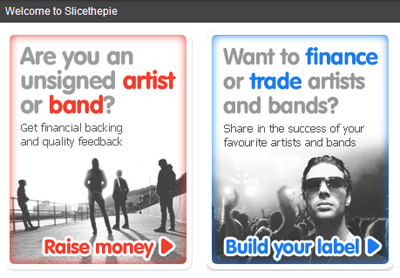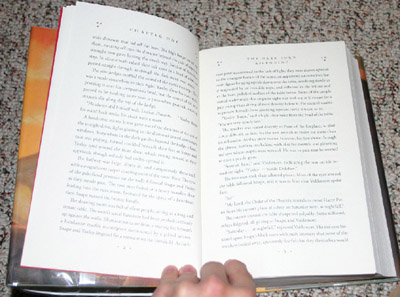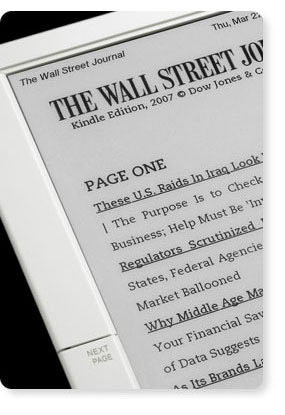Jun 7, 2008
Nobody Wants to Read a Book on a Computer: Why the Kindle Matters After All
 Don’t know the Kindle? Well, it’s Amazon’s New Wireless Reading Device, and it costs a mere $359.00 USD, plus about $10.00+ for any books you want to read on it. Perusing the Amazon page on which they’re actually selling the Kindle, you get the impression they’re pretty desperate to make this work — the pictures of the features and the links to digital books and the endless testimonials are enough to make you feel like you’ve wandered into a used-car salesmen’s convention.
Don’t know the Kindle? Well, it’s Amazon’s New Wireless Reading Device, and it costs a mere $359.00 USD, plus about $10.00+ for any books you want to read on it. Perusing the Amazon page on which they’re actually selling the Kindle, you get the impression they’re pretty desperate to make this work — the pictures of the features and the links to digital books and the endless testimonials are enough to make you feel like you’ve wandered into a used-car salesmen’s convention.
By now, I’m sure you’ve heard that the music industry has been revolutionised by iTunes and its kin. Watching movies will never be the same since Netflix came along. And even TV is slowly metamorphosizing into something new on websites like YouTube and Hulu (I may not have convinced you yet, but give me time).
The publishing industry is changing too — magazines and newspapers now have to compete with a flood of content from a whole new source — but the changes really only affect short-format printed materials. If anything, the Internet has been a boon to the book-publishing industry (if not the book retail industry); books are still printed and read the same as they ever were, only now there are new tools (like Amazon) for reaching consumers and expanding the selection of available books. But a book is a book is a book. The long tail model has most certainly had an effect on publishing (Amazon figures large in The Long Tail, which is where I’m getting most of the inspiration for this post), but mostly to do with warehousing, distribution, recommendation algorithms, etc. etc. — not digital media, per se.
In other words, digital distribution instantly opened up a new, long-tail universe (and a can of worms) for music, TV, film, and short-format publishing. But nobody wants to read a book on a computer. Books have been way behind the times in entering the digital age — there has really been no competition to books from any other source. The Kindle will make this possible, but what’s interesting is where the push for the digital distribution of books is coming from.
Music, TV, and film are all available online because there was a consumer demand for it. It started with piracy, but slowly online distribution of these three media / formats is gaining acceptance. Independent content producers have been quick to take advantage of the shift to digital distribution, but it’s important to remember that they’re taking advantage of an infrastructure (like Napster and BitTorrent, or iTunes et al) that was originally put in place because consumers demanded the convenience and selection that — at the time — only piracy offered.
Music is a good case study to illustrate the evolution of online distribution, because it was one of the first and remains one of the biggest types of content distributed digitally, either legally or not. Online music distribution, as I’ve written previously, was cooked up by consumers, not producers or distributors, and only after fighting this losing battle tooth and nail did legitimate digital distributors like iTunes or Amazon or Zune Marketplace or eMusic or Rhapsody give music producers a chance to recoup some of the revenue they were losing to piracy. The entrance of artists and content producers onto the scene has been very 11th hour; the current systems of digital distribution was already in place before indie acts (and even larger acts) started to take advantage of limitless distribution on a larger scale.
Three articles from the past month demonstrate this. They’re notable not only because they exemplify the opportunities for independent digital distribution, but also because they’re, well, from the past month. This is being written about in mainstream media today — not 9 years ago when Napster launched, or anytime since then.
 The first article appeared in Maclean’s May 26, 2008 issue (p. 83): “This album brought to you by — you.” The article features Sellaband.com and Slicethepie.com, two websites set up to help new and independent acts promote themselves. The thrust of the article is that new resources are available for bands not signed to major labels, which can help them fundraise and promote themselves online. They highlight artists who have not made a dime, and also artists who, by self-distributing through these sites, have raised upwards of $75,000.00 of investment.
The first article appeared in Maclean’s May 26, 2008 issue (p. 83): “This album brought to you by — you.” The article features Sellaband.com and Slicethepie.com, two websites set up to help new and independent acts promote themselves. The thrust of the article is that new resources are available for bands not signed to major labels, which can help them fundraise and promote themselves online. They highlight artists who have not made a dime, and also artists who, by self-distributing through these sites, have raised upwards of $75,000.00 of investment.
Article number two comes from Metro Toronto, June 2, 2008 (p. 16): “A new route to indie music.” This article describes a new music program at Seneca College which is designed to help independent artists succeed in the music business. They don’t teach you how to sing or play an instrument — what they do teach you is the business end of trying to produce and distribute your own music in today’s marketplace, and make a living as a musician without selling your soul to a label.
The title of the third article — published the same day as the last one, and available at Ars Technica — says it all: “Get yourself on iTunes for $30.” TuneCore is a new $30-a-year service that helps acts not affiliated with labels to get their music onto sites like iTunes and eMusic, which (unlike, for example, YouTube) don’t accept just anyone.
A picture starts to emerge: an industry in which, for a long time, you were either in or out is finally starting to change, letting smaller acts take advantage of tools like self-distribution to carve out a decent living in niche markets. The all-or-nothing mentality of music publishing is lifting, letting acts which would have been shut out of the traditional label model find ways of doing the work themselves.
It’s also interesting to note that all three articles are written from the perspective of the artist — “these are tools that can help indie acts” — as opposed to from the perspective of record labels, or online distributors, or even the consumers gaining access to these new acts. The emphasis in very much on the self-distributors themselves — the archetypal “struggling musicians,” who now, with a skill, entrepreneurialism and luck, can make it on their own.
What does all this have to do with the Kindle? Self-distribution is only the latest chapter in the story of media going digital. It starts with demand, at which point startups start sharing pirated material, much to the chagrin of traditional distributors who must eventually, reluctantly, get on board. Only once the infrastructure to legally distribute via the Internet is in place do the opportunities for self-distributors blossom. This has happened with music, it has happened with magazines and newspapers, and it’s happening now with film and television. This is not, however, happening with books. Why? Probably it’s because there’s no demand for digital books the way there was for digital movies, music, and TV. Because, as I said, nobody wants to read a book on a computer.
 Remember when Harry Potter and the Deathly Hallows was leaked? The reaction from Potter fans was telling. One might have expected jubilation that a) the long wait for the book just got shorter, and b) the book was now free! Why weren’t fans rejoicing? Because, obviously, they didn’t want to read the book like that; they wanted to curl up in bed with a glass of milk and read the book by candlelight — not look at fuzzy images on a computer screen. The most likely outcome of the leak for fans who had been looking forward to enjoying the book like that was having the ending spoiled before they could read it themselves. The moral of the story is (everybody now:) is nobody wants to read a book on a computer.
Remember when Harry Potter and the Deathly Hallows was leaked? The reaction from Potter fans was telling. One might have expected jubilation that a) the long wait for the book just got shorter, and b) the book was now free! Why weren’t fans rejoicing? Because, obviously, they didn’t want to read the book like that; they wanted to curl up in bed with a glass of milk and read the book by candlelight — not look at fuzzy images on a computer screen. The most likely outcome of the leak for fans who had been looking forward to enjoying the book like that was having the ending spoiled before they could read it themselves. The moral of the story is (everybody now:) is nobody wants to read a book on a computer.
Thus — the high-profile Potter case notwithstanding — the usual chain of events leading to digital distribution has not panned out the same way for books as it has for other media. The evolution from consumer’s wants to self-distributor’s wants is not going to occur in long-form publishing. But does this mean that self-distributors will be left out in the cold?
Book publishing has a reputation for being particularly cutthroat; not only is competition high, but success in writing books is distinctly more binary than in most other creative arts. Even a musician not signed to a label can scratch out a living playing live gigs or backing for other talent, but a writer probably isn’t going to pay the rent by charging a $5 cover to listen to him read from his unpublished novel. Is it possible that this was the impetus to create the Kindle? Did we skip over the niche-demand part of digitally distributing books and go straight to the niche-supply? Is this an example of self-distribution being prioritised even though publishers weren’t forced into it by piracy?
That’s doubtful. Publishers have their own very selfish reasons for hoping the Kindle takes off.* And yet … the result is that the tools for self-distribution are going to be made available to everyone. The effect is the same as if pirated books had forced publishers to distribute digitally: self-distributors now have instant access to the fabled long tail, and no work of art has too small an audience to make it worth putting out there.
I don’t mean to suggest that the Kindle is destined to be a success. Although two very important groups are praying that the Kindle takes off (publishing houses and self-distributing writers), the opinion of the third group (consumers) is the only one that matters. But I think the Kindle is a very important first step. It’s really expensive, and all it does is show books — it’s not going to revolutionise publishing overnight. I do think, though, with a push from both artists and publishers, consumers might realise that this is something they want, even though they didn’t know they wanted it.
 What I expect will happen, once the first generation of Kindle goes down in flames, is that the concept will be reborn. Remember the Apple Newton? It’s considered a flop — and yet the same concept, returning a few years later, was a huge success. The Kindle is too limited and expensive to find its way into everyone’s purse, but if the same features were combined into, say, a tablet PC or even a mobile handset, why wouldn’t everyone read books on them? Many people who have used the Kindle say a few pages in you forget you’re using a device at all — and there are other good features too, like portability, the ability to hold hundreds of books at once, or even to download new books, magazines and newspapers on the go, and the option to change the typeface or print size if you want to. Really, the only thing separating the Kindle from a tablet PC is the quality of the image; the whole point of the Kindle is that it looks like paper (little pixellation, and no backlight) and doesn’t cause the eyestrain (and backstrain) reading on a computer can cause. If the same attributes were available on another device, it’s not hard to imagine that people will take advantage of them.
What I expect will happen, once the first generation of Kindle goes down in flames, is that the concept will be reborn. Remember the Apple Newton? It’s considered a flop — and yet the same concept, returning a few years later, was a huge success. The Kindle is too limited and expensive to find its way into everyone’s purse, but if the same features were combined into, say, a tablet PC or even a mobile handset, why wouldn’t everyone read books on them? Many people who have used the Kindle say a few pages in you forget you’re using a device at all — and there are other good features too, like portability, the ability to hold hundreds of books at once, or even to download new books, magazines and newspapers on the go, and the option to change the typeface or print size if you want to. Really, the only thing separating the Kindle from a tablet PC is the quality of the image; the whole point of the Kindle is that it looks like paper (little pixellation, and no backlight) and doesn’t cause the eyestrain (and backstrain) reading on a computer can cause. If the same attributes were available on another device, it’s not hard to imagine that people will take advantage of them.
It sometimes feels inevitable to me that paper books will be phased out, to at least the same extent that chemical-based photography has been replaced by digital photography. That’s the way the tide is turning. But my fallible intuition aside, it boils down to this: publishers want to go digital, unsigned writers who self-distribute want to go digital, and consumers are apathetic. But that apathy could turn quickly into support, given the added features digital books offer — the stumbling block now is how to get those features into a more accessible device.

*I hope it’s obvious why self-distributors like the idea of the Kindle: they can get their book published even if a publisher thinks nobody wants to read it, which is the case with most struggling writers. But why would publishers, who make their money printing books, want to switch to digital? Music companies, after all, want you to buy a CD, not download it. Right?
I think it’s because publishing is pretty expensive. The raw commodity costs can be high, but shipping and warehousing is also an issue. 3 tonnes of CDs is a lot more units than 3 tonnes of a big fat book. Also, CDs are relatively cheap to make, only a few cents each, but print a million copies of a book nobody wants to read, and you’re sitting on a big pile of very expensive garbage. Books get cheaper to produce the more you make of them, whereas mass producing CDs or DVDs doesn’t drastically affect the per-unit cost of production.
The benefits of digital distribution have more or less been lost on the music, television and film industry. The book publishing industry, it seems — and perhaps because it’s the only one not forced into it by piracy — is the only one to see the benefits and embrace them.
I will never read a book on a digital device; at least not willingly. I imagine this being a more important platform for academic literature, since nobody has any real affection for textbooks–not to mention that they can be quite cumbersome. On the other hand, if you’re going to be forced to fork out $125 for an economics textbook and you have a choice between a traditional book or a digital copy, I’d inevitably choose the former. It is the only medium that we know of that has the durability of centuries behind it, unlike digital copies, which go extinct the minute your hard drive inexplicably dies.
There does come a point where the real thing is preferable to the simulacra.
Well, I guess I should have said that myself. When it comes to self-distribution, there’s really two major groups: vanity projects, and industry or educational texts.
If some crazy person wants to write a book and offer it for sale, and nobody wants to read it, no harm done. And you never know if it might just be a huge success. But likely, it will amount to not much.
Industry texts and educational texts, on the other hand, must be printed, because even though as few as a dozen people will read it, the demand is imperative. If it’s something like a user manual for a scanning electron microscope, for example, the fact that there’s only need for 100 copies doesn’t mean the demand can be ignored.
And especially with university textbooks, where cost is a factor — isn’t “Out of Print” the last thing you want to see when you’re looking for a textbook? With digital books, you’ll never be out of print again.
“Out of Print” will always be a factor with Old Media, digital or otherwise.
I can’t see how anything that is, or will be, a “classic” book can be enjoyed any way other than with book in hand. How can you replicate that unique smell that a book has? That is a subconscious pleasure associated with reading a book for enjoyment.
And, of course, books on shelves are a staple of decorating our homes, showing our guests that we are part of a respectable culture.
I think the reason that consumers quickly embraced the music-film-television digital revolution is that in order to listen or hear these things, one has always been reliant on technology to do it. You’re asking one technology to replace the other. Going digital, simply made it cheaper, easier, faster, smaller, more productive. By introducing the “e-book,” you’re asking consumers to adopt technology for something that one has never needed technology to do before — making it more difficult, more expensive (in terms of initial costs) and more unknown. Technology for books has always been a behind the scenes evolution in terms of printing innovations — something the average consumer very rarely thinks about. Now you’re asking them to think about it. And in my experience, when you force someone to think about something they’ve never had to think about before, there will be resistance.